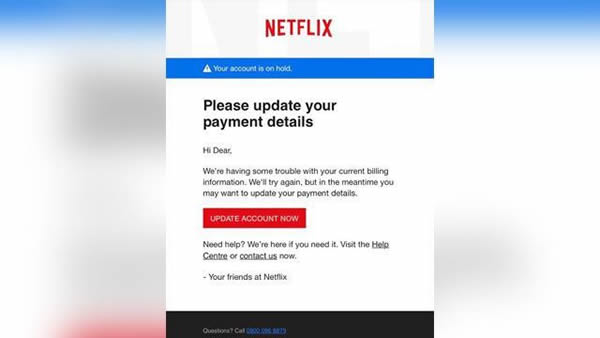The U.S. Federal Trade Commission has circulated a warning about a new international Netflix phishing cheat that tries to deceive Netflix subscribers into revealing their account identifications and payment information. The cheat uses a tried and tested method to get that information: The warning of account closure because of payment information being out of date.
Users are transmitted a message requesting them to update their payment details since Netflix has experienced difficulties getting the monthly subscription payment. The user is provided with an “Update Account Now” button which they can click to insert their accurate banking/card information. Nevertheless, clicking the link will not guide the user to the official Netflix site, instead, they will be taken to a web page on a site operated by the scammer. On that site, Netflix login identifications will be harvested together with the banking information entered by subscribers.
The latest campaign was recognized by the Ohio Police Division, which shared a copy of the phishing electronic mail on Twitter. The FTC also issued a warning about the new Netflix phishing cheat in the latest blog post.

Image Source: Ohio Police via FTC
As you can see from the picture, the message appears official as it has the Netflix logo and color scheme. The message also strongly looks like official electronic mail communications often sent by Netflix. Nevertheless, there are tell-tale indications that the electronic mail is not what it appears. Netflix is naturally conscious who their subscribers are and addresses electronic mails to users by their first name. In this electronic mail, the message starts with “Hi Dear.”
Less visible is the hyperlink, however it is something that is fairly easy to check by hovering the mouse arrow over the button. That will show the actual URL, which is not the official Netflix website. One more indication is the phone number on the electronic mail is a U.S. number, which for any person based in another country would be extremely doubtful.
If the link is clicked, the page the user is directed to appears official and is nearly indistinguishable from the actual site, even though if a user checks the URL it will verify they are not on the actual Netflix site for their country.
All of these warning indications must be identified by users, but several people fail to cautiously check messages before clicking. To avoid phishing cheats such as this, make certain you carefully check all electronic mail messages before replying and if ever you receive an electronic mail containing any warning, visit the authorized URL for the firm directly by entering in the website directly into the browser instead of clicking a link in an electronic mail.
